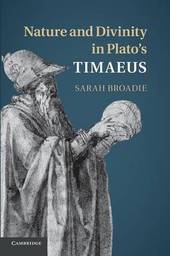
|
Nature and Divinity in Plato's Timaeus
Paperback / softback
Main Details
| Title |
Nature and Divinity in Plato's Timaeus
|
| Authors and Contributors |
By (author) Sarah Broadie
|
| Physical Properties |
| Format:Paperback / softback | | Pages:316 | | Dimensions(mm): Height 229,Width 152 |
|
| Category/Genre | Western philosophy - Ancient to c 500
Philosophy - metaphysics and ontology |
|---|
| ISBN/Barcode |
9781107686199
|
| Classifications | Dewey:113 |
|---|
| Audience | | Professional & Vocational | |
|---|
| Illustrations |
Worked examples or Exercises
|
|
Publishing Details |
| Publisher |
Cambridge University Press
|
| Imprint |
Cambridge University Press
|
| Publication Date |
12 June 2014 |
| Publication Country |
United Kingdom
|
Description
Plato's Timaeus is one of the most influential and challenging works of ancient philosophy to have come down to us. Sarah Broadie's rich and compelling study proposes new interpretations of major elements of the Timaeus, including the separate Demiurge, the cosmic 'beginning', the 'second mixing', the Receptacle and the Atlantis story. Broadie shows how Plato deploys the mythic themes of the Timaeus to convey fundamental philosophical insights and examines the profoundly differing methods of interpretation which have been brought to bear on the work. Her book is for everyone interested in Ancient Greek philosophy, cosmology and mythology, whether classicists, philosophers, historians of ideas or historians of science. It offers new findings to scholars familiar with the material, but it is also a clear and reliable resource for anyone coming to it for the first time.
Author Biography
Sarah Broadie is Professor of Moral Philosophy and Wardlaw Professor at the University of St Andrews. She is the author of Ethics with Aristotle (1991) and Aristotle's Nicomachean Ethics (2002), and (as Sarah Waterlow) of Passage and Possibility: A Study of Aristotle's Modal Concepts (1984) and Nature, Change, and Agency in Aristotle's Physics: A Philosophical Study (1984).
Reviews"Every stance which the author develops reward its reader. This study is truly a major accomplishment, and it is bound to set the term of the debates about Plato's Timaeus for a long time to come." --Phoenix
|